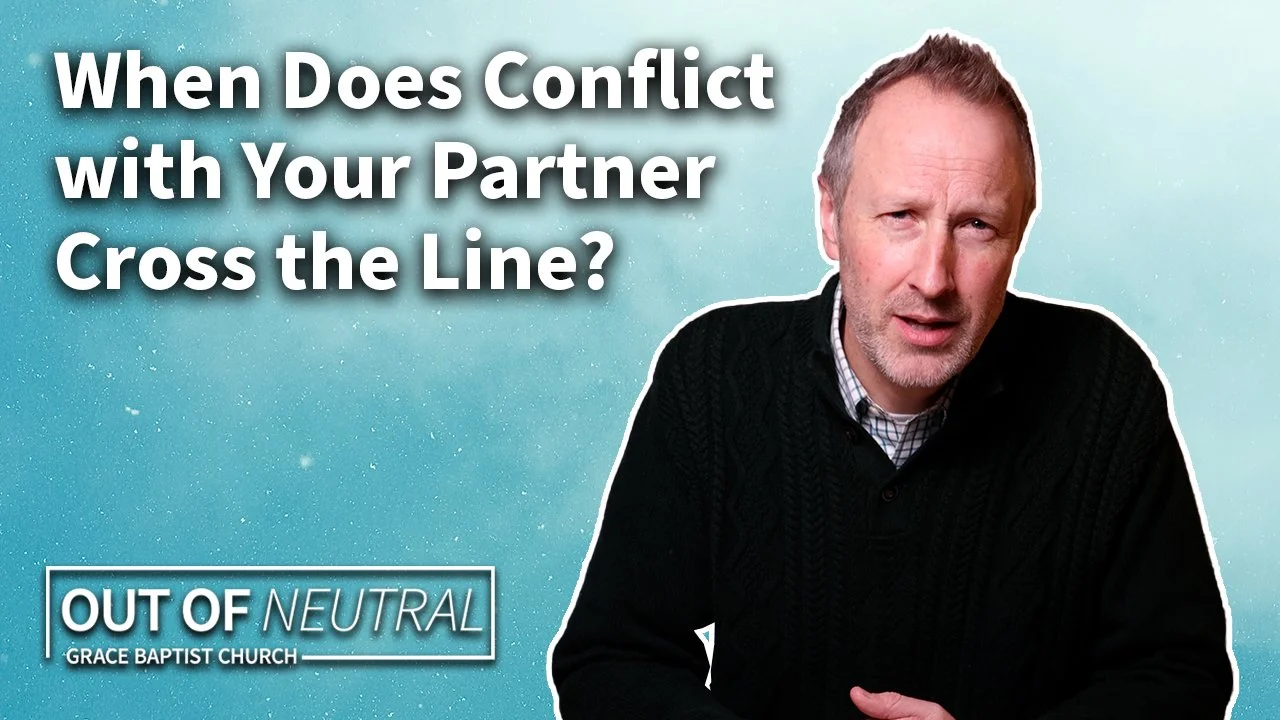Watch
Click on the image above for the video of this article or keep reading below for the text version.
Listen
Read
People don’t tend to talk a lot about the conflicts they have. That’s understandable, of course, but the result can be that we don’t have any sense of what’s normal. I often hear people say, “Every couple argues,” but what does that mean? Someone might wrongly conclude that every couple has shouting matches with threats and intimidation. That’s not the case! When does conflict cross the line? When should you be concerned? What kind of behaviour should be out of bounds?
Darby Strickland (Is It Abuse?) has an argument inventory that’s a good starting point for identifying unhealthy patterns of conflict and potentially abusive behaviour. When one partner always has to be right, their desires are treated as demands, and their communication is about control, it’s a sign that something is wrong. Ask these questions of your own conflicts and consider whether they point to deeper issues.
1. When you have a conflict, does your partner play fair?
Conflict often results where there’s hurt, misunderstanding, or disagreement. So, it’s not surprising that people aren’t at their best. We often become more emotional, agitated, and tense. That doesn’t excuse someone from using sarcasm or ridicule to hurt you, though. When your partner mocks your words, keeps you from speaking, and distorts what you said or did to control the discussion, it’s a powerplay not just an argument.
2. Can you bring up an issue without it coming back on you?
The emotion of arguments can keep them from being productive. We don’t listen as well as we should, and we forget to show the same courtesy that we would otherwise aim for. That’s different, though than when your attempts to bring up a concern or a hurt are regularly deflected back on you. When you try to address an issue, it’s a red flag if the other person has a habit of changing the subject, bringing up something unrelated that you did, or portraying himself or herself as the victim.
3. Can you get into a conflict without being insulted?
Healthy arguments are always about the issue and never about the person. Talking about a lie is one thing; calling someone a liar is another. There’s hope for a person to change their behaviour, but if you judge their character, you’re only left with shame and condemnation. Conflicts shouldn’t involve your partner discrediting you, disrespecting you, or putting you down. Whatever the issue is, the goal should be to invite the other’s cooperation in trying to address it, not tearing the other person down in anger or revenge.
4. Do your conflicts lead to threats or intimidation?
Some couples feel that there isn’t abuse in their relationship because there’s no physical violence. Sometimes, though, threats and intimidation can be all that’s needed to accomplish the same goal. Yelling, swearing, and ultimatums don’t have a place in healthy conflict. And if your partner makes you feel physically unsafe in an argument, the conflict has crossed the line.
Colossians 3:19 warns husbands against being harsh with their wives. 1 Peter 3:7 urges them to show understanding and honour toward them. James 1:19 tells us to be slow to speak and slow to anger. Ephesians 4:15 tells us to speak the truth in love. And Ephesians 4:29 tells us that the only words that ought to come out of our mouths are the ones that are good for building up and giving grace to those who hear.
Nobody’s communication is perfect, and everyone’s conflict skills can be improved, but if you see some of the danger signs above in your own relationship, it may be time to get some help and outside perspective. May God give us all grace in our conflicts.
In awe of Him,
Paul











